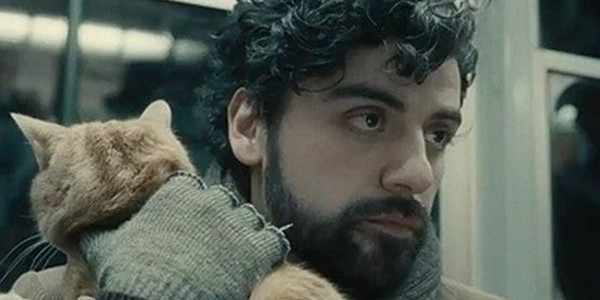

Directors: Joel and Ethan Coen, 2013 (R)
It's hard to get inside Llewyn Davis. In this sense, it's hard to get Inside Llewyn Davis. Critics have raved about this latest film from the auteur brothers who have produced such an amazing portfolio of film. But its non-linear plot (or lack of plot) and seemingly episodic narrative, counter-pointed with folk music that delivers back-story, is hard to appreciate, particularly for non-folk music aficionados. Throw in quirky symbolism and archetypes and it needs some careful reflection. I appreciated the film but could not really resonate with it.
We meet Llewyn Davis (Oscar Isaac) in the opening scene, strumming a guitar and singing to a crowd at a folk club in Greenwich Village in 1961 New York. He is a cranky curmudgeon, who manages to turn most people off through his blatant obnoxious behaviors. He has no place to live, so couch-surfs night-to-night with what friends he has left.
The Coens have crafted a beautifully shot film. The cinematography is muted, giving a nostalgic feel to the era when folk music was changing. The acting and singing is first-rate. Isaac gives a strong performance as a protagonist who is difficult to like, and he does all his own singing live. It is his film and he delivers.
After the opening scene, he meets a besuited stranger in the back-alley behind the club, and the man beats the snot out of him. Why? We don't know. And he doesn't seem to know. Next thing we see is an orange tabby cat staring down at Llewyn as he awakes on a couch. This cat will appear and re-appear throughout, clearly communicating something about Llewyn -- more on that later.
Llewyn, we discover, has cut a record but has no money. His talent is not recognized, and yet he continues to dream of fame, despite living gig-to-gig. He will not go back to the merchant marine life, like his dad who lives a despondent existence alone in a nursing home. Llewyn wants more.
Llewyn, though, has possibly impregnated his best friend's wife. Jean (Carey Mulligan) spits venom at him for this. Yet her husband Jim (a bearded Justin Timberlake), knowing nothing about his wife's infidelities, encourages Llewyn to play on his new track, which Llewyn considers a sell-out. Offered the choice between future royalties and immediate pay as a contractor, Llewyn takes the money to pay for the abortion.
The whole film forms a journey of sorts, both physical and metaphorical, for Llewyn Davis, as he travels to Chicago with a junkie Jazz musician (John Goodman) and his beat poet valet Johnny Fives, before coming back to New York.
Perhaps the key to understanding the film is the cat. It escapes the apartment. Llewyn has to find and rescue it. He does not know its name. He is not sure of its sex. Later, when he returns it to its owners, he is told its name: Ulysses. Ulysses, we remember was the Latin version of the Greek name Odysseus, who featured in Homer's "The Odyssey" (which formed the loose basis for the Coen's O Brother Where art Thou). Here, Llewyn Davis has his own odyssey journey. Perhaps more thematically, Ulysses is the title of the novel by James Joyce telling the episodic story of a day in the life of Irishman Leopold Bloom in Dublin. Like Bloom, Llewyn Davis has various episodes during a week in his life, mostly in New York.
Tim Wainwright, in his article for The Atlantic, suggests something different. He thinks the cat is Llewyn Davis. Or better stated, Llewyn Davis is the cat. His thoughtful essay explores this proposition in depth. I think he is on to something, but more likely the cat represents Llewyn Davis. Llewyn wants to be loose and free. He does not want to be trapped by "normal life". He looks down on his sister for merely existing. He wants to rise above what he sees as mediocrity. The naming of the cat is the turning point.
Before the cat is named, he runs free, able to scoot out of the apartment. Once h e is named, he is unable to get loosed. Naming allows him to be controlled. When Llewn Davis sits down before a producer in Chicago (F. Murray Abraham), he is asked to play something from "Inside Llewyn Davis," the name of his album record. When he does, he reveals himself. He lets this person inside himself, so he is in a sense named and known. The man tells him, "there is no money in this." He is known and rejected, devastated.
Biblically, naming does connote control. It is in and through the name of Jesus that people were healed (Acts 3:6). Naming identifies a person, and in this identification identity is revealed. When we call on the name of Jesus, we are declaring our faith in him and asking him for help. In so doing, we place ourselves in a position of subservience, allowing him to have control.
Moreover, during his return from Chicago, Llewyn Davis hits a cat. Stopping, he sees it limp away into the forest. I think the cat, representing himself, shows here that Llewyn Davis is and has been hitting himself all along. He is self-defeating, putting people off with his manner and speech. He cannot take advice and move forward. He is stuck in a negative spiral. His choices lead him down. Even on this road trip, he stares momentarily at the signpost to Akron, where beckon a lost love and possible home to settle in. Instead, he drives onto New York where failure awaits. Jeffrey Huston, in his review for Crosswalk, commented that the cat "weaves its own presence throughout the story, serving as a metaphoric through-line, incarnating the very transitory nature of Llewyn's ambitions – temperamental, elusive, always escaping his grasp". It is his own choices that cause these ambitions to elude him.
Do we do this? Are we unwilling to move with the future? Do we act in ways that damage ourselves? Are we stuck in negativity? Sometimes, we need to accept the truth, even if it hurts. Sometimes we need to let ourselves be known and accept the control that it might bring.
The movie ends with a twist that is not explained. We see it and wonder what is going on. Perhaps the point is that Llewyn Davis is still stuck in a cycle that he can't break out of. His life as a beat singer in the dingy clubs is going nowhere but will continue to come full circle until he accepts responsibility for his actions and their consequences.
Copyright ©2014, Martin Baggs



No comments:
Post a Comment